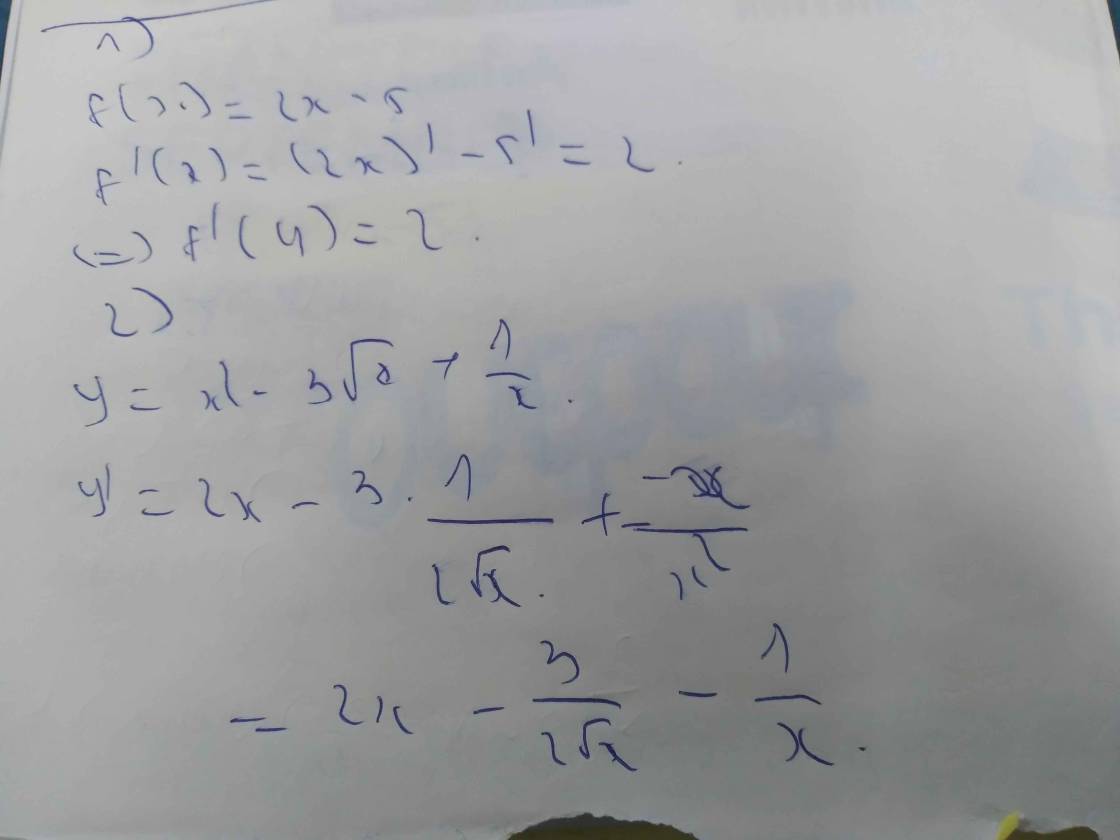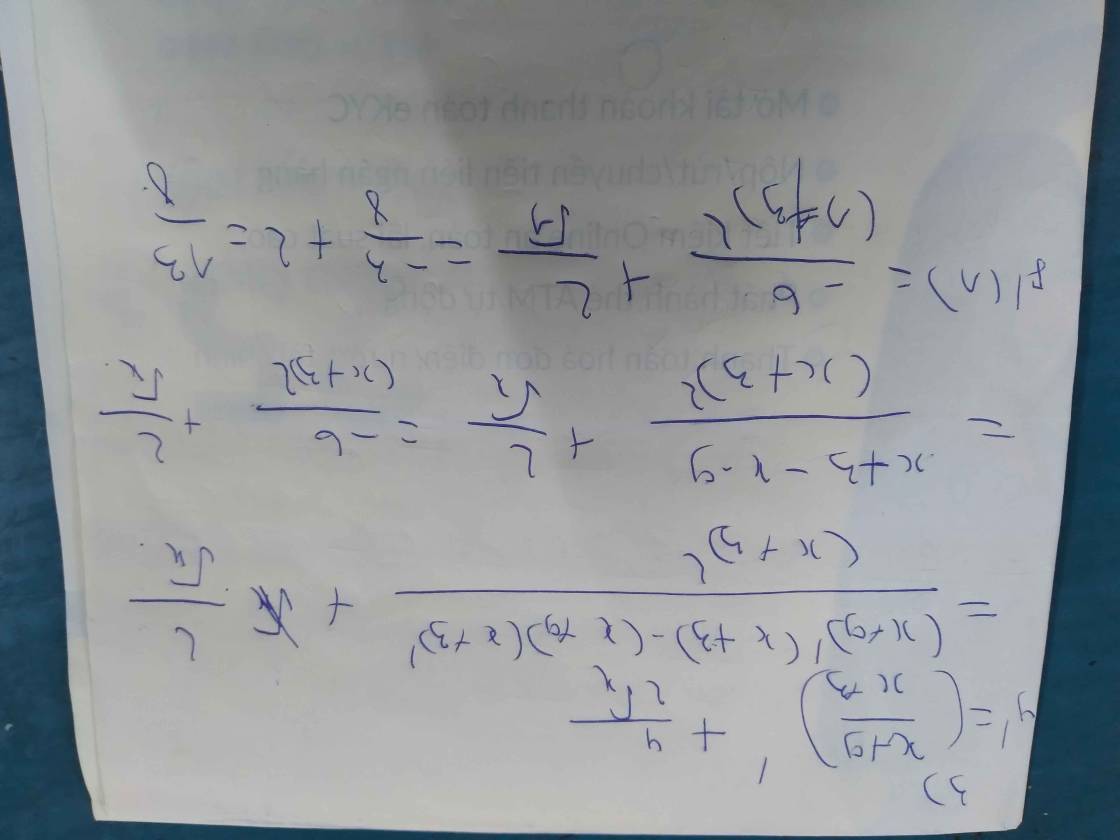
Hãy nhập câu hỏi của bạn vào đây, nếu là tài khoản VIP, bạn sẽ được ưu tiên trả lời.



Lời giải:
\(x\in [-\sqrt{2}; \sqrt{2}]\Rightarrow x^2\leq 2\Rightarrow \sqrt{x^2+1}\leq \sqrt{3}\)
\(y=\frac{x+1}{\sqrt{x^2+1}}\geq \frac{x+1}{\sqrt{3}}\geq \frac{-\sqrt{2}+1}{\sqrt{3}}\)
Vậy $y_{\min}=\frac{-\sqrt{2}+1}{\sqrt{3}}$ khi $x=-\sqrt{2}$
$y^2=\frac{x^2+2x+1}{x^2+1}=1+\frac{2x}{x^2+1}$
$y^2=2+\frac{2x-x^2-1}{x^2+1}=2-\frac{(x-1)^2}{x^2+1}\leq 2$
$\Rightarrow y\leq \sqrt{2}$
Vậy $y_{\max}=\sqrt{2}$ khi $x=1$

1) \(f\left(x\right)=2x-5\)
\(f'\left(x\right)=2\)
\(\Rightarrow f'\left(4\right)=2\)
2) \(y=x^2-3\sqrt[]{x}+\dfrac{1}{x}\)
\(\Rightarrow y'=2x-\dfrac{3}{2\sqrt[]{x}}-\dfrac{1}{x^2}\)
3) \(f\left(x\right)=\dfrac{x+9}{x+3}+4\sqrt[]{x}\)
\(\Rightarrow f'\left(x\right)=\dfrac{1.\left(x+3\right)-1.\left(x+9\right)}{\left(x-3\right)^2}+\dfrac{4}{2\sqrt[]{x}}\)
\(\Rightarrow f'\left(x\right)=\dfrac{x+3-x-9}{\left(x-3\right)^2}+\dfrac{2}{\sqrt[]{x}}\)
\(\Rightarrow f'\left(x\right)=\dfrac{12}{\left(x-3\right)^2}+\dfrac{2}{\sqrt[]{x}}\)
\(\Rightarrow f'\left(x\right)=2\left[\dfrac{6}{\left(x-3\right)^2}+\dfrac{1}{\sqrt[]{x}}\right]\)
\(\Rightarrow f'\left(1\right)=2\left[\dfrac{6}{\left(1-3\right)^2}+\dfrac{1}{\sqrt[]{1}}\right]=2\left(\dfrac{3}{2}+1\right)=2.\dfrac{5}{2}=5\)

1, \(y=2-sin\left(\dfrac{3x}{2}+x\right).cos\left(x+\dfrac{\pi}{2}\right)\)
\(y=2-\left(-cosx\right).\left(-sinx\right)\)
y = 2 - sinx.cosx
y = \(2-\dfrac{1}{2}sin2x\)
Max = 2 + \(\dfrac{1}{2}\) = 2,5
Min = \(2-\dfrac{1}{2}\) = 1,5
2, y = \(\sqrt{5-\dfrac{1}{2}sin^22x}\)
Min = \(\sqrt{5-\dfrac{1}{2}}=\dfrac{3\sqrt{2}}{2}\)
Max = \(\sqrt{5}\)

1) \(y=x^2-3\sqrt[]{x}+\dfrac{1}{x}\)
\(\Rightarrow y=2x-\dfrac{3}{2\sqrt[]{x}}-\dfrac{1}{x^2}\)
2) \(f\left(x\right)=\dfrac{x+9}{x+3}+4\sqrt[]{x}\)
\(\Rightarrow f'\left(x\right)=\dfrac{1.\left(x+3\right)-1\left(x+9\right)}{\left(x+3\right)^2}+\dfrac{2}{\sqrt[]{x}}\)
\(\Rightarrow f'\left(x\right)=\dfrac{x+3-x-9}{\left(x+3\right)^2}+\dfrac{2}{\sqrt[]{x}}\)
\(\Rightarrow f'\left(x\right)=\dfrac{-6}{\left(x+3\right)^2}+\dfrac{2}{\sqrt[]{x}}\)
\(\Rightarrow f'\left(1\right)=\dfrac{-6}{\left(1+3\right)^2}+\dfrac{2}{\sqrt[]{1}}=-\dfrac{3}{8}+2=\dfrac{13}{8}\)

a: \(y'=4\cdot3x^2-3\cdot2x+2=12x^2-6x+2\)
b: \(y'=\dfrac{\left(x+1\right)'\left(x-1\right)-\left(x+1\right)\left(x-1\right)'}{\left(x-1\right)^2}=\dfrac{x-1-x-1}{\left(x-1\right)^2}=\dfrac{-2}{\left(x-1\right)^2}\)
c: \(y'=-2\cdot\left(\sqrt{x}\cdot x\right)'\)
\(=-2\cdot\left(\dfrac{x+x}{2\sqrt{x}}\right)=-2\cdot\dfrac{2x}{2\sqrt{x}}=-2\sqrt{x}\)
d: \(y'=\left(3sinx+4cosx-tanx\right)\)'
\(=3cosx-4sinx+\dfrac{1}{cos^2x}\)
e: \(y'=\left(4^x+2e^x\right)'\)
\(=4^x\cdot ln4+2\cdot e^x\)
f: \(y'=\left(x\cdot lnx\right)'=lnx+1\)

1. \(y'=3x^2\sqrt{x}+\dfrac{x^3-5}{2\sqrt{x}}=\dfrac{7x^3-5}{2\sqrt{x}}\)
2. \(y'=3x^5+\dfrac{3}{x^2}+\dfrac{1}{\sqrt{x}}\)
3. \(y'=2-\dfrac{2}{\left(x-2\right)^2}\)
Tính đạo hàm của các hàm số sau:
a) \(y = {x^3} - 3{x^2} + 2x + 1;\)
b) \(y = {x^2} - 4\sqrt x + 3.\)

tham khảo:
a)\(y'=\dfrac{d}{dx}\left(x^3\right)-\dfrac{d}{dx}\left(3x^2\right)+\dfrac{d}{dx}\left(2x\right)+\dfrac{d}{dx}\left(1\right)\)
\(y'=3x^2-6x+2\)
b)\(\dfrac{d}{dx}\left(x^n\right)=nx^{n-1}\)
\(\dfrac{d}{dx}\left(\sqrt{x}\right)=\dfrac{1}{2\sqrt{x}}\)
\(\dfrac{d}{dx}\left(f\left(x\right)+g\left(x\right)\right)=f'\left(x\right)+g'\left(x\right)\)
\(\dfrac{d}{dx}\left(cf\left(x\right)\right)=cf'\left(x\right)\)
\(y'=\dfrac{d}{dx}\left(x^2\right)-\dfrac{d}{dx}\left(4\sqrt{x}\right)+\dfrac{d}{dx}\left(3\right)\)
\(y'=2x-2\sqrt{x}\)

Đặt \(2\sqrt{x+1}+\sqrt{4-x}=t\Rightarrow t^2-4=3x+4+4\sqrt{-x^2+3x+4}\)
Ta có:
\(2\sqrt{x+1}+\sqrt{4-x}\le\sqrt{\left(4+1\right)\left(x+1+4-x\right)}=5\)
\(\sqrt{x+1}+\sqrt{x+1}+\sqrt{4-x}\ge\sqrt{x+1}+\sqrt{x+1+4-x}\ge\sqrt{5}\)
\(\Rightarrow\sqrt{5}\le t\le5\)
Phương trình trở thành:
\(t^2-4=mt\) \(\Leftrightarrow f\left(t\right)=t^2-mt-4=0\)
\(ac=-4< 0\Rightarrow pt\) luôn có 2 nghiệm trái dấu (nghĩa là đúng 1 nghiệm dương)
Vậy để pt có nghiệm thuộc \(\left[\sqrt{5};5\right]\Rightarrow x_1< \sqrt{5}\le x_2\le5\)
\(\Rightarrow f\left(\sqrt{5}\right).f\left(5\right)\le0\)
\(\Rightarrow\left(1-\sqrt{5}m\right)\left(21-5m\right)\le0\)
\(\Rightarrow\dfrac{\sqrt{5}}{5}\le m\le\dfrac{21}{5}\)
2.
Chắc đề đúng là "tìm m để giá trị nhỏ nhất của hàm số đạt giá trị lớn nhất"
Hàm bậc 2 có \(a=2>0\Rightarrow y_{min}=-\dfrac{\Delta}{4a}=-\dfrac{9\left(m+1\right)^2-8\left(m^2+3m-2\right)}{8}=-\dfrac{m^2-6m+25}{8}\)
\(\Rightarrow y_{min}=-\dfrac{1}{8}\left(m-3\right)^2-2\le-2\)
Dấu "=" xảy ra khi \(m-3=0\Rightarrow m=3\)


y = \(\sqrt[3]{\left(x^2+8\right)^2}-3\sqrt[3]{x^2+8}+1\)
Đặt \(\sqrt[3]{\left(x^2+8\right)}=t\)
Do x2 + 8 ≥ 8 với mọi x
⇒ t ≥ 2 với mọi x
y = t2 - 3t + 1
Min của hàm số đã cho là Min của y = g(t) = t2 - 3t + 1 trên [2 ; +\(\infty\))
g(t) đồng biến trên \(\left(\dfrac{3}{2};+\infty\right)\) nên nó đồng biến trên (2 ; +\(\infty\))
⇒ Giá trị nhỏ nhất của g(t) trên [2 ; +\(\infty\)) là g(2) = - 1